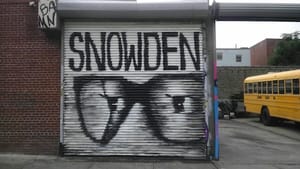Stay in the Loop
BSR publishes on a weekly schedule, with an email newsletter every Wednesday and Thursday morning. There’s no paywall, and subscribing is always free.
The surveillance state then and now
Edward Snowden in conversation with Jeremy Scahill

Journalist Jeremy Scahill of The Intercept took the stage at the Free Library of Philadelphia (FLP) on Monday night for a conversation with Edward Snowden. It was the 16th anniversary of 9/11, “the greatest security failure in U.S. history,” as Snowden noted. The discussion focused on how that date changed our security policy in ways that have redistributed power away from the people and into the hands of a few major players.
Hero or traitor?
Snowden, 34, is best known for leaking classified National Security Agency (NSA) documents in 2013 that revealed to the world the astonishing breadth of the mass surveillance to which the emails, phone calls, and other communications of all Americans — and many others around the world — have been subjected for years. For that, he’s considered a hero on the left and among libertarians, and a traitor on the right.
Snowden, a former CIA agent who was working as an NSA contractor with the defense firm Booz Allen Hamilton, considered himself a patriotic American and was shocked to find proof that his government was spying on its citizens and violating the Constitution on a massive scale. After releasing the documents, he was forced to go on the run, seeking asylum in a stranger-than-fiction chase around the world. With his passport canceled and the U.S. military going to extraordinary lengths to find him (they even forced down the plane of Bolivian president Evo Morales in order to search it), Snowden was granted asylum in Russia, where he now lives.
The event was simulcast in the FLP’s lobby (a cavernous marble space with unfortunate acoustics) and streamed to ticketholders online. Audience members were invited to ask questions, a few of which seemed to assume Snowden was omniscient: “Can you get Trump’s search history?”
Of power and patriotism
The more serious questions, though, showed a thoughtful, even earnest Snowden who insisted that anyone and everyone must do whatever they can do defend democratic principles.
{photo_2}
Asked what he would do differently, Snowden poignantly discussed the patriotism he grew up with in a military family, which led him to enlist in the U.S. Army to fight in the Iraq War. “I fundamentally believed that our government would never lie to us,” he said, and held onto that belief throughout an accomplished career in the intelligence sector. His regret? “I should have been more skeptical,” he said, urging audience members to “question not just whistleblowers but the most powerful members of society.”
Power, Snowden explained, is hard to give up. Extend extraordinary powers to officials, and it’ll “begin to feel natural and necessary.” The events of 9/11 didn’t lead Washington insiders to write the USA PATRIOT Act, he explained: it was already written but had never passed. The attacks simply gave the George W. Bush administration the opening it needed to push through an act expanding the government’s powers to an extraordinary degree.
Though deeply critical of Donald Trump, Snowden didn’t spare Barack Obama from criticism, pointing out that his administration expanded the surveillance program even further. “It doesn’t matter how much you trust a president,” he argued, “because the office and its powers will always be passed to someone else.” Those who were fine with Obama holding the power to circumvent the Constitution now fret that the same powers have been passed to Trump.

Obama, Snowden said, also went out of his way to ensure that Snowden was never allowed to make his case to a jury. “I offered to get on the next plane and submit to whatever a jury decided in a fair trial,” he said. “Instead I got a letter that said, ‘We promise we won’t torture you.’” The administration charged Snowden under laws that specify trial before secret FISA courts, not a public jury trial.
Spy games
Is Snowden a Russian spy? Absolutely not, he says; he criticizes Russian president Vladimir Putin publicly and would prefer to live in Latin America. But he also pointed out that he destroyed his copy of the leaked files before fleeing for Hong Kong to protect himself from coercion by other governments.
Asked about Russian interference in the 2016 US presidential election (he joked that if he broached the subject his connection might have some trouble, which it did, seemingly on cue), Snowden explained that most governments try to hack other governments’ high-value election-related targets. He also added that, as an engineer, he values hard evidence over speculation.
Ultimately, Snowden’s message was one of active citizenship. “I saw something that wasn’t right and did what I could,” he said. “If everyone does what they can, it will be enough.”
What, When, Where
Edward Snowden in conversation with Jeremy Scahill: The Surveillance State Then and Now. September 11, 2017, at the Free Library of Philadelphia's Parkway Central Library, 1901 Vine Street, Philadelphia. (215) 686-5322 or freelibrary.org.
Sign up for our newsletter
All of the week's new articles, all in one place. Sign up for the free weekly BSR newsletters, and don't miss a conversation.

 Sarah Grey
Sarah Grey